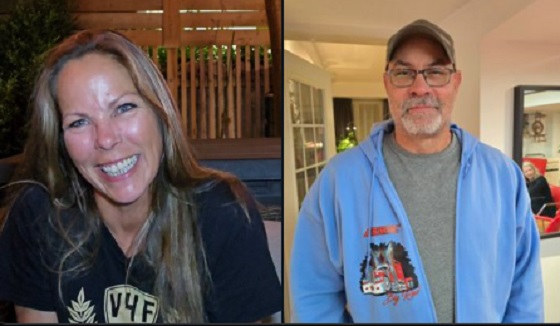Censorship Industrial Complex
‘Authoritarian censorship’: Poilievre denounces nurse’s suspension for opposing gender ideology

From LifeSiteNews
Conservative leaders, including Pierre Poilievre, are defending British Columbia nurse Amy Hamm, who was fined over $93,000 and suspended for stating gender is based on biology.
Conservatives are coming to the defense of British Columbia nurse Amy Hamm after was fined over $93,000 for saying gender is based on biology.
In an August 20 post on X, Conservative Party leader Pierre Poilievre denounced a ruling by the British Columbia College of Nurses and Midwives (BCCNM) that mandated Hamm pay $93,639.80 in legal fees and suspended her license for one month for her statements opposing LGBT ideology.
“A nurse with a spotless track record gets fined and suspended for pointing out there are two genders, and for praising world renowned author & women’s rights advocate
@jk_rowling,” Poilievre declared.
“This is authoritarian censorship,” he warned. “We must restore free speech and free thinking in a free country.”
Many other Conservative Members of Parliament (MPs) also came to Hamm’s defense, condemning the actions taken against her as censorship while voicing concerns over the implications of punishing professionals for publicly voicing their opinions.
“Fining a nurse $93,000 for acknowledging biological sex is punishing her for recognizing a scientific reality required to safely practice medicine,” MP Leslyn Lewis wrote on X. “We cannot ignore that in medicine, biological sex matters.”
“Nurses and doctors have to distinguish between sex and gender in order to treat patients safely — for example, when prescribing medications, diagnosing conditions, or determining appropriate procedures,” she added.
Additionally, Lewis raised concerns over “whether a professional can safely do their job if they are punished for acknowledging biological realities.”
Similarly, MP Andrew Scheer called the ruling “completely unjust,” adding that “everyone who cares about free speech should be outraged!”
Scheer quoted a 1926 warning from British author G.K. Chesterton that read, “We shall soon be in a world in which a man may be howled down for saying that two and two make four, in which people will persecute the heresy of calling a triangle a three-sided figure, and hang a man for maddening a mob with the news that grass is green.”
In March, a ruling from the BCCNM disciplinary panel found that Hamm committed “unprofessional conduct” by publicly discussing the dangers of the LGBT agenda in three articles and a podcast appearance.
Later that month, Hamm shared on social media that Vancouver Coastal Health fired her from her nursing position without severance after she was found guilty of “unprofessional conduct.”
Hamm found herself targeted by the BCCNM in 2020 when she co-sponsored a billboard reading, “I (heart) JK Rowling.” This sign was a nod to the famous British author’s public comments defending women’s private spaces from being used by gender-confused men.
The BCCNM accused Hamm of making “discriminatory and derogatory statements regarding (so-called) transgender people” while identifying herself as a nurse or nurse educator.
According to the college, Hamm’s statements were “made across various online platforms, including but not limited to podcasts, videos, published writings, and social media” between July 2018 and March 2021.
In July, Hamm filed human rights complaints with the British Columbia Human Rights Tribunal to hold both organizations accountable for targeting her over her beliefs. She has since announced that she is taking her case to the British Columbia Supreme Court.
Censorship Industrial Complex
Winnipeg Universities Flunk The Free Speech Test

From the Frontier Centre for Public Policy
By Tom Flanagan
Frances Widdowson faced mob hostility for saying unmarked graves have yet to be proven
Dr. Frances Widdowson’s visit to Winnipeg on Sept. 25 and 26 should have been an opportunity for debate. Instead, the city’s universities endorsed a statement that undermines academic freedom.
Widdowson, a political scientist known for questioning official narratives about residential schools, came to meet students who wanted to ask about claims of “unmarked graves.” Those claims, which became national headlines in 2021 after ground-penetrating radar surveys at former school sites, remain unproven because no physical evidence of burials has been found.
For many Canadians, the claims of “unmarked graves” were a shocking revelation, given how widely the story was reported as a settled fact.
That context alone should have been enough to spark discussion. Instead, the University of Manitoba and the University of Winnipeg joined the Assembly of Manitoba Chiefs in issuing a statement that should embarrass both schools. At institutions dedicated to study and inquiry, the instinct should be to ask more questions, not to shut them down.
At first, the statement sounded reasonable. It said the universities did not “condone violence or threats to anyone’s safety.” But that did not stop Widdowson from being roughed up by a mob at the University of Winnipeg. It would be refreshing if the universities condemned mob violence with the same urgency they condemned a professor answering questions. Their silence sends its own message about which kind of behaviour is tolerated on campus.
The bigger problem is the statement’s claim that there is a single “truth” about residential schools, known to “survivors,” and that questioning it amounts to “denial.” In reality, 143 residential schools operated with federal support for more than a century. What happened varied widely from place to place and decade to decade.
That is a subject for historical research, grounded in evidence and debate, not pronouncements about capital-T “Truth” issued by communications offices. Canadians deserve to know that history is still being studied, not declared untouchable.
Worse still was the statement’s promise to “press the Government of Canada to enact legislation that makes residential school denialism a crime.” The Assembly of Manitoba Chiefs is free to say what it wants. But universities lending their names to a demand that historical inquiry be criminalized is beyond misguided; it is dangerous.
Criminalizing “denialism” would mean that even challenging details of the residential school record could be punishable by law. Canadians should think carefully before accepting laws that turn historical debate into a criminal offence.
The University of Chicago’s widely praised statement on academic freedom puts it well: “the University’s fundamental commitment is to the principle that debate or deliberation may not be suppressed because the ideas put forth are thought by some or even by most members of the University community to be offensive, unwise, immoral, or wrong-headed. It is for the individual members of the University community, not for the University as an institution, to make those judgments for themselves.” That principle should also guide Canadian universities. Academic freedom is not a luxury; it is the foundation of higher education.
Worst of all, these positions were not even issued in the names of presidents or academic leaders. They were issued under “media relations.” Imagine being a serious scholar or scientist at one of these universities and discovering that the media office had taken a political stance on your behalf.
I know how I would feel: undermined as a professional and silenced as a citizen.
Tom Flanagan is a professor emeritus of political science at the University of Calgary and a Fellow of the Royal Society of Canada. He is a senior fellow at the Frontier Centre for Public Policy and co-editor of the best-selling book Grave Error: How the Media Misled Us (and the Truth about Residential Schools).
Business
Elon Musk announces ‘Grokipedia’ project after Tucker Carlson highlights Wikipedia bias

From LifeSiteNews
By Joseph Quinn
Wikipedia co-founder Larry Sanger explained how Wikipedia systematically blacklists and “deprecates” conservative sources. Wikipedia remains one of the most heavily used information sources online and is integrated with Google search results.
Elon Musk has announced plans to build “Grokipedia,” a new open-source online encyclopedia under his artificial intelligence company xAI.
“Will be a massive improvement over Wikipedia,” Musk wrote on X. “Frankly, it is a necessary step towards the xAI goal of understanding the Universe.”
We are building Grokipedia @xAI.
Will be a massive improvement over Wikipedia.
Frankly, it is a necessary step towards the xAI goal of understanding the Universe. https://t.co/xvSeWkpALy
— Elon Musk (@elonmusk) September 30, 2025
The announcement came days after Tucker Carlson’s interview with Larry Sanger, a co-founder of Wikipedia and a vocal critic of the organization since his departure in 2002.
Larry Sanger built Wikipedia as an unbiased repository of the world’s knowledge, and then stood helplessly by as activists and intel agencies turned it into the most comprehensive propaganda op in human history. There’s nothing more corrupt.
(0:00) The Origins of Wikipedia… pic.twitter.com/J59oEejCG2
— Tucker Carlson (@TuckerCarlson) September 29, 2025
Sanger explained how Wikipedia systematically blacklists and “deprecates” conservative sources. Seeing LifeSiteNews on the list, Carlson said that the platform has become “a weapon of ideological, theological war.”
Musk echoed Sanger’s criticisms, affirming Judicial Watch president Tom Fitton’s claim that “Wikipedia is a smear machine for the Left.”
💯
— Elon Musk (@elonmusk) September 30, 2025
Musk later amplified memes promoting Grokipedia, calling it “an open source knowledge repository that is vastly better than Wikipedia.”
Join @xAI and help build Grokipedia, an open source knowledge repository that is vastly better than Wikipedia!
This will be available to the public with no limits on use. https://t.co/3CnfrvNIpI
— Elon Musk (@elonmusk) September 30, 2025
He also affirmed Sanger’s “Nine Theses,” which call for dismantling Wikipedia’s centralized editorial control.
Some good suggestions from the co-founder of Wikipedia https://t.co/bgwBmi6uXN
— Elon Musk (@elonmusk) September 30, 2025
Musk has not released technical details of the Grokipedia project but said that Grok AI will be independent of Wikipedia “by the end of the year.”
Images of a potential logo were also shared on his X account.
Wikipedia should have just taken that $1 billion offer from Elon Musk, it’s too late, the rival is coming: Grokipedia! pic.twitter.com/cLBKfPRgyO
— SMX 🇺🇸 (@iam_smx) September 30, 2025
Wikipedia remains one of the most heavily used information sources online and is integrated with Google search results. Critics argue that its governance model allows biased editors – described as “ideologically-driven thought police” – to shape content and suppress dissenting viewpoints, particularly on political, cultural, and religious topics.
A similar initiative called “Infogalactic” was launched in 2016. A “fork” of Wikipedia, it was designed to decentralize control and allow multiple perspectives. While Infogalactic never reached Wikipedia’s scale, it established a model for alternative knowledge repositories.
Attracting a critical mass of editors and establishing credibility remain significant challenges facing such alternatives. Musk’s involvement signals a higher-profile challenge to Wikipedia’s dominance, combining xAI’s technological resources with his public platform on X.
Musk has not provided a clear timeline, but the announcement positions xAI to mount a direct challenge to Wikipedia’s dominance of the information ecosystem.
-

 COVID-191 day ago
COVID-191 day agoDevastating COVID-19 Vaccine Side Effect Confirmed by New Data: Study
-

 COVID-192 days ago
COVID-192 days agoFreedom Convoy Sentencing: Lich and Barber escape prison terms but will spend months in house arrest
-

 Alberta1 day ago
Alberta1 day ago‘Visionary’ Yellowhead Pipeline poised to launch Alberta into the future
-

 Crime2 days ago
Crime2 days agoCanadian Sovereignty at Stake: Stunning Testimony at Security Hearing in Ottawa from Sam Cooper
-

 COVID-192 days ago
COVID-192 days agoChris Barber will not see prison time for his role in peaceful Freedom Convoy
-

 Red Deer11 hours ago
Red Deer11 hours agoThe City of Red Deer’s Financial Troubles: Here Are The Candidates I Am Voting For And Why.
-

 Alberta1 day ago
Alberta1 day agoSheriffs shut down Olds drug house
-

 Crime2 days ago
Crime2 days agoThe Bureau Exclusive: Chinese–Mexican Syndicate Shipping Methods Exposed — Vancouver as a Global Meth Hub





